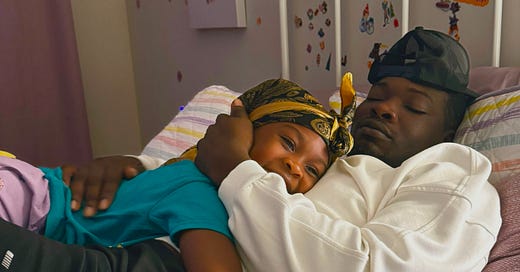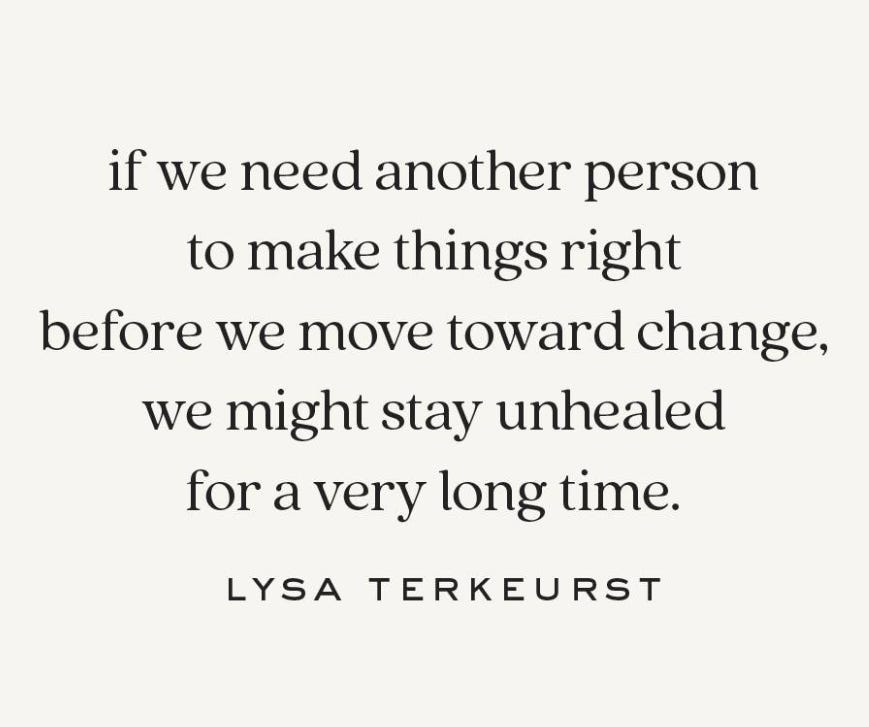You Caused Me Trauma but You Won’t Be Accountable
Keeping ourselves safe from the people who are supposed to keep us safe.
In the last decade I’ve noticed a massive spike in the number of conversations that I hear about boundaries. Even my seven-year-old daughter will deploy a small, moist hand to your face if you lean in for a hug when she does not want to be hugged.
“Daddy, you’re in my bubble, fall back please.”
I respect that, now excuse me cry while cry into my dinner.
Seriously, I want her to know that her voice and values matter. Thats why I honor the request and I go about my business (even though it kills me inside). This is much bigger than me. Many of my adult clients have a tough time establishing boundaries when the trusting adults in their lives didn’t validate their early attempts at practicing that voice as kids. This begins the lifelong process of internalizing the belief and attitude that their standards are less significant. It gets even more complex when those standards keep them safe from people who are supposed to keep them safe.
In my Q&A box, someone asked me how to set boundaries for a parent who does not believe that they caused trauma. Here is the video:
I would love to jump into my unaccountable parent bag, but there is ground work to be laid before we cha-cha slide into boundary setting.
Setting Expectations:
What we need most in these moments is for that parent to be accountable for their part and participate in the repair work. We want for them to listen and validate this massive piece of our lived experience. Unfortunately, this is almost never how healing works. When people repeatedly demonstrate an inability to meet an expectation, this is a good indicator that those expectations are a few sizes too big for them.
When there is evidence that this failure to meet expectations is grounded in their beliefs, values and immovable perspective, that too is a pop- up notification that the behavior is unlikely to change easily if at all. If only these “indicators” were as clear as a check engine light.
Know What Doesn’t Work
Anger, frustration and other negative emotions hi-jack the brain and scramble the signals that it receives. Sometimes the signal “explaining in more detail isn't convincing them” doesn’t register. This is how we find ourselves in a cycle of miscommunication where our “factual” fights to be heard and their “objective” fights to defend against accusation. It goes nowhere.
Try to remember that doing more of an ineffective thing does not increase its effectiveness. If a person is committed to misunderstanding you, then a step-by-step breakdown is unlikely to change that. Perhaps pressing forward this way isn’t best when our brains can quickly associate vulnerability with pain.
Not Worth the Wait:
In my work I’ve discovered a thing called dependent healing. It’s a process that occurs when we wait for something external to happen before we dig into the internal work. Not only does that thinking undermine our own resilience, it also places too much power in hands that are not likely to help us here. This thinking also trains our brains to wait for external factors to sync up before we begin our own problem solving process. It’s like waiting for someone else to bring groceries before you begin to cook, even though there is enough in your fridge to make a decent meal and you’re very hungry. If they never show up with the yams, are we really supposed to starve to death?
5 Things To Consider
Therapy isn’t just for individuals and couples. Explore the idea of your parent joining a therapy session. A non-partial party could be a great mediator for you all.
When we can’t make the pain go away, we try to figure out ways to cope and make the pain more manageable. Still very valuable!
Accepting that a parent will likely not assume accountability helps you decrease the craving for what is unlikely to be obtainable. That protects you of burdensome false hope.
If they admitted fault today, it would likely feel good, but it would not eliminate the pain. The power to self-validate recognizes your feelings and experiences above all else.It doesn't outside funding to stay in business.
Our frustrations may always exist in some way, but their negative effects on us can be minimized noticeably over time.
Job Well Done,
KG







Kier , you’ve set a precedence for relevancy that is unmatched - thank you. With the title alone , validation of those traumatized is clear. Regarding the context - This is so applicable…. And so, is there a chance , that it extends into a case where the unresolved trauma of that person, now ends up spilling into their adult relationships , ie marriage? Where now, they are causing or have caused trauma to their significant other and will not hold themselves accountable ??
This was a refreshing read. For me, it is easier to accept that someone may not take upon the duty of accountability than it is for me to continuously check myself for craving their understanding, especially when this craving has been a part of your existence for so long. However, two things can exist at the same time which I assume is the reality of healing - the multifaceted nature of understanding and longing. I am so proud of us for trying!